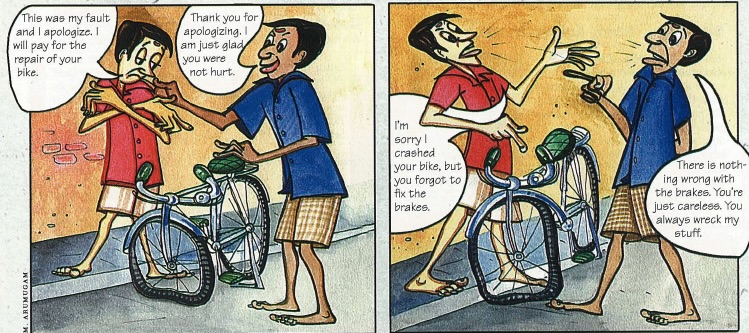When we make mistakes and hurt others, anger builds up in the other person and our guilt grows. Most people end up blaming the other person, trying to fend off guilt, seeking physical distance or severing relationships. These are the consequences of having inadequate skills for accepting the reality of others’ feelings and humanness. What people should do, when they cause grief to others, is apologize, but that is hard for some, usually because they think apologizing is “losing.” Apology is not synonomous with defeat. On the contrary, it reduces the tension and anger of others, and our own guilt. Most of the time the anger the other feels and our own guilt are the result of our unwillingness to admit a mistake.
Does apologizing humiliate us and put us down? Not really. It shows we are big enough to take responsibility. In addition, a sincere apology demonstrates that we care about the other person and the relationship. Apologizing, properly done, can have positive results, building a stronger bond, and increasing mutual respect. Here are the keys, as defined by a Hindu psychologist.
DO…
When giving an apology:
* Choose the right time to make your apology. It may be better to wait until the other person has calmed down. Otherwise, your apology may be ignored. On the other hand, an immediate apology may prevent a blowup. Perhaps the best policy is to apologize twice right after your offense, then again when the other person calms down. Just don’t wait three months!
* Relax. Look the person directly in the eye. Speak clearly and calmly.
* Take responsibility for your action. Say, “This was my fault and I apologize.”
* Consider the other person’s point of view. “I understand how this has affected you.”
* Explain (but not at length) how the mistake occurred.
* Work for a solution to the problem you caused.
* You may wish to follow the apology with a special gift to demonstrate your sincerity. If you have broken a possession, offer some replacement.
When receiving an apology:
* Listen to the explanation.
* Thank the other person for apologizing.
* Respond positively. Don’t harbor anger and resentment.
* Let the person apologizing know how good the apology makes you feel.
* Try to work out a solution that is in everyone’s interest
DO NOT…
When giving an apology:
* Don’t mutter a shame-faced, inaudible apology while gazing away from the person.
* Don’t accuse the other of being partly or mostly to blame.
* Don’t refer to mistakes the other has made in the past.
* Don’t try to apologize indirectly by telling others you are sorry. Speak to the person
directly.
* Don’t say you’re sorry in indirect ways (gifts, etc.) instead of personally apologizing.
* Don’t apologize for something you didn’t do.
When receiving an apology:
* Don’t look away.
* Don’t be silent. Don’t say, “Forget it,” “It’s OK” or “It didn’t bother me anyway,” as if you don’t mean it.
* Don’t start an argument by bringing in other things the person did as well, or by making nasty comments.
* Don’t make unnecessary
demands or make the other person feel guiltier.
* Long after the person has apologized, don’t keep reminding him of what he did.
Remember, our relationships are our key to ourselves. How we treat others is how we will ultimately be treated.
By Greesh C. Sharma, PHD,
Institute of Behavior
Modification, Pennsylvania
699 West Trenton Ave.
Morrisville, Pennsylvania 19067
